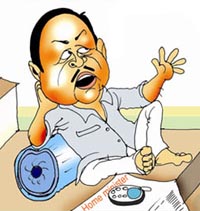Feb 13, 2026
Feb 13, 2026
by Bijoyeta Das
 If we view the state as a fossilized remnant of Man's not to distant vile and brutish past, then it is all right to imbue it with the right to apply the moral principle in matters of governance. Modern Man is rational and this invests him/her with the right to free choice. Often the more fortunate mistake the poverty of means that are the outcome of historical wrongs or mere chance with poverty of thought and the lack of capacity. This fires them with philanthropic urges. Needless to state, the existing order is very much a part of their scheme of things as this accords stability to their circumscribed existence. This story runs on in its endless periodicity. The hierarchy remains though the players continually change roles. The underlying script is rerun, only, each time it gets subtler and more in tune with the illusions of the times. This sets the agenda for those at the helm of affairs to provide for all manner of laws and regulations and the generally intrusive behavior of the state that scarce does anyone any good. The above sets the tenor for the enduring debate on the reasonableness (rather the lack of it) of moral policing indulged in by the state.
If we view the state as a fossilized remnant of Man's not to distant vile and brutish past, then it is all right to imbue it with the right to apply the moral principle in matters of governance. Modern Man is rational and this invests him/her with the right to free choice. Often the more fortunate mistake the poverty of means that are the outcome of historical wrongs or mere chance with poverty of thought and the lack of capacity. This fires them with philanthropic urges. Needless to state, the existing order is very much a part of their scheme of things as this accords stability to their circumscribed existence. This story runs on in its endless periodicity. The hierarchy remains though the players continually change roles. The underlying script is rerun, only, each time it gets subtler and more in tune with the illusions of the times. This sets the agenda for those at the helm of affairs to provide for all manner of laws and regulations and the generally intrusive behavior of the state that scarce does anyone any good. The above sets the tenor for the enduring debate on the reasonableness (rather the lack of it) of moral policing indulged in by the state.
24-Sep-2006
More by : Bijoyeta Das